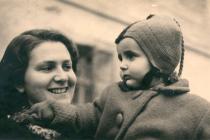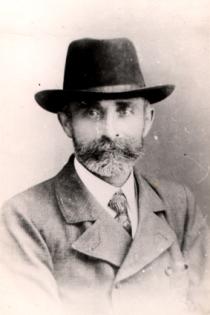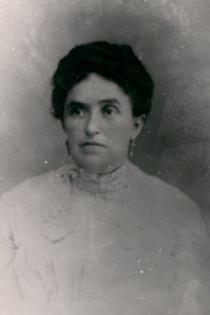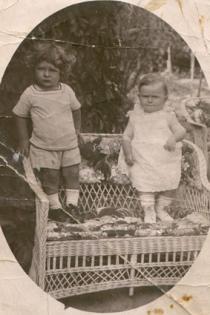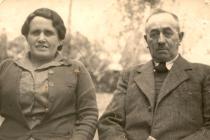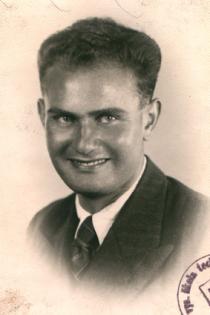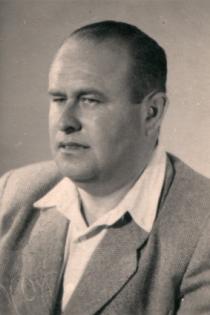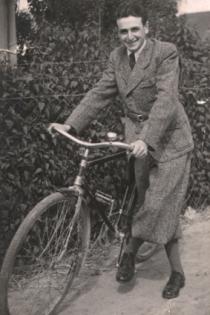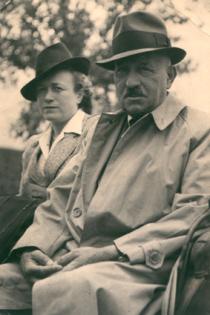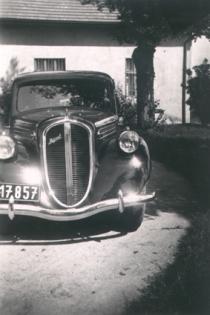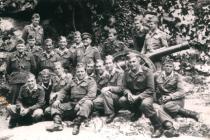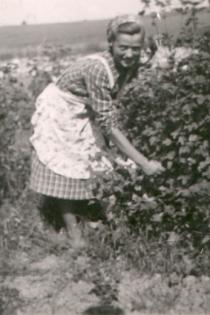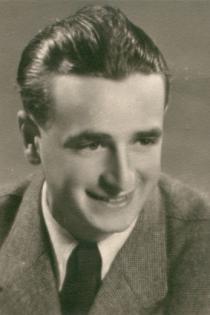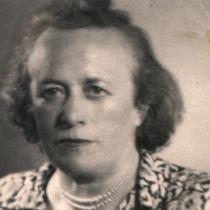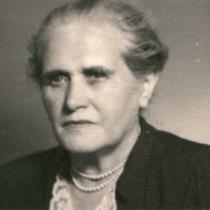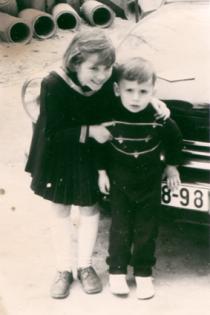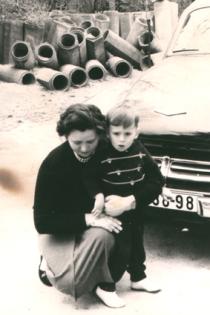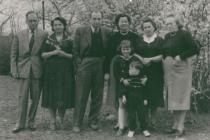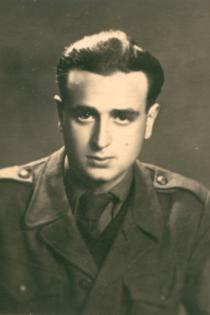
Bedrich Hecht
Nitra
Slovak Republic
Interviewer: Dasa Slobodnikova
Date of interview: July 2006
Mr. Bedrich Hecht is energetic, vital and extremely active. He is a person that talks openly about his opinions, thoughts and feelings. He has traveled extensively, has a wide scope of knowledge, and is constantly interested in events at home and abroad. His fate has been marked by many experiences that have shaped his life. Despite everything that he has lived through, his reminiscences concern themselves mainly with nice and pleasant stories about those nearest and dearest to him, who Mr. Hecht still carries with him in his heart.
My family background
My grandparents were from Slovakia. My father’s parents lived in Svrbice [a town in the Topolcany region – Editor’s note], I don’t precisely know if it was the Hlohovec or the Topolcany region. My paternal grandfather was named Filip Hecht, and my grandmother was named Janka, née Weiss. I don’t remember my grandparents, all I know about them is what my father told me. In Svrbice my grandfather had a smaller farm, a store and a pub. In the store he sold sugar, salt and flour, a typical village shop, and he also had a pub. He and his wife served people in the store and pub. He also had a helper from the village. They were open every day. In the pub they sold mostly brandy. But later he sold his property and moved to Preselany [a town in the Topolcany region – Editor’s note]. There he bought a farm, which then expanded. After some time he bought another farm, and also owned a distillery. My grandparents on my father’s side had six children, three sons and three daughters. But the oldest son, Natan, died young, as he had a heart defect. My grandfather’s two sons then remained on the farms. My uncle Henrich ran the farm in Preselany, and the farm in Vycapy fell to my father, Aladar. The farming estate was named Maly Chosen.
Another thing I know about Grandpa Filip Hecht is that he was a very hard-working and
frugal person. He lived with my father when he married my mother. He took care of the cows and milk. He was so frugal that he used to ration my parents’ food. He didn’t give them as much as they wanted. My mother used to tell me that Grandpa Hecht liked my brother [Pavol Hecht] very much, because he was his firstborn grandson. So they would always tell him to go ask for milk. In Preselany my grandfather concerned himself just with farming. He also owned a distillery, which he got from Count Aponyi, who ran up a debt with my grandfather, and he bought that distillery from him.
My father also had three sisters. One, named Aranka, Zlatica [The Hungarian Aranka and the Slovak Zlatica are two version of the same name] married some Steiner in Subcarpathian Ruthenia 1. Another of my father’s sisters was married and lived in Tesarske Mlyny in the Nitra region, I don’t know what her name was. My father’s third sister was named Janka, and married someone in Hungary. There, she was named Brak. But I can’t say when exactly they were born. The one that lived in Subcarpathian Ruthenia was older than my father. Janka was younger than he was.
My paternal grandparents weren’t very religious; the Adlers were more religious, but my mother was the least religious of them, because she was the youngest. They dressed in a modern fashion for the times; they didn’t wear traditional garments, but both grandmothers wore wigs. My maternal grandparents are buried in the Jewish cemetery in Nitra, and my father’s parents are buried in the Jewish cemetery in Preselany.
The house in Preselany where my parents lived with my grandfather was quite nice. It was an oblong house with six rooms. Then my father moved to Vycapy [Vycapy Opatovce], to the Maly Chosen estate. There was this one burned-out building there that he had fixed up. The estate had a manor-house with seven rooms, which is where we lived. Both houses had a kitchen, a larder and a washroom. It was furnished in a modern fashion for the times, back then low closets were in fashion. One could say that it was more luxurious furniture than nowadays. I had one brother [Pavol], and we shared a room so that we wouldn’t be lonely. In Preselany we had electricity as well as running water. In Chosen there wasn’t any electricity, and we used petroleum lamps. There was a well there, from which water was pumped to a tank, as there were no water mains. Not everyone had running water because it was expensive. The village didn’t have water mains. That means that everyone had to have a well and some sort of motor with which water was pumped into a tank, and from there a pipe led water into the house. Otherwise, you went to the well and drew water with buckets, and carried them home. Only wealthier people had running water.
My mother’s parents were from Preselany. My grandfather was named Jakab Adler, and my grandmother was Rachel. They also farmed. I don’t remember my grandfather, but I do remember Grandma. My cousin Viliam, who died during the Slovak National Uprising 2, and I used to vex her when we were little. I remember how we used to constantly pester her for money that she’d made from selling milk.
Grandpa Adler was a devout man. He lived life as it was normally lived in villages; there was a community there, and they also had a prayer hall. Grandpa Hecht, from what people who knew him say, was approachable and hard-working. He was quite aloof, and wasn’t like my father, who was a more merry type. He would go to dances, was more cultured, lived a more cultural life. The old people were more in the background. I don’t remember my grandparents’ siblings and their children at all.
All my grandparents spoke Hungarian because they had attended Hungarian schools, German, and of course Slovak. I also learned Hungarian, but I only speak ‘kitchen Hungarian’. Most of the time we spoke Slovak, but as there were many Hungarians in Vycapy, we also used to speak Hungarian, and German less so.
The house where we lived also had a garden. We had fruit trees and grew vegetables for our own consumption. The farm had employees, as we had a medium-large farm. My mother had a household helper. As far as I know, my grandmothers also had household helpers. Our helpers did housework. They weren’t from the village that we lived in. They were usually from nearby villages, from Lefantovce or Cetin. They lived in the house with us, and had their own room. They were always single young women. I remember two of our helpers the best. One was from Cetin, was an old maid and was a homebody. She was named Agnes. She was an older, conscientious woman. I don’t know exactly how long she worked for us, about five or seven years. The other helper was from Lefantovce. She was named Stefa [Stefania]. The farm workers were full-time employees. I think that they were called hinds. They worked all year long for a certain salary, and also got grain and a place to live. During seasonal work, seasonal workers would come; they would come in the spring to cultivate sugar beets and corn, and then worked during the harvest. Back then it was scythed by hand, there were no combines. We had horse-drawn harvesters. The farm had seven or eight employees. There were more seasonal ones. Back then the term pairs was used. Fourteen pairs used to come to do work, which is 28 people. The people that worked for us weren’t Jews. Neither the full-time workers nor the seasonal ones.
In the village we lived alongside non-Jewish residents. We only had neighbors on one side, on the other side was our farm. We had good relations with our neighbors. While we were still living in Preselany, our neighbors’ house burned down. They were named the Petriks, and were saddlers. I remember how my brother and I brought them everything that we found at home. We even brought them our mother’s shoes, and when our mother wanted to go out, she had nothing to put on her feet. I can’t say much about how our neighbors helped us, because we didn’t need anyone’s help. We had our own employees. But when our neighbors needed something, our parents helped them, because we were a little on the wealthier side. For example when they had little children, my mother would give them milk and didn’t take any money from them. That’s what relations with our neighbors were like. We gave what we didn’t need ourselves.
We used to spend our vacations at home. My brother used to often go to Hungary to Aunt Janka’s. He was there mostly during the summer. I was at home. We attended school all year round, I attended school in Nitra, where I also lived. During vacations we would come home, and our father would always wake us up around 4:00, 4:30 a.m. Our mother would often reproach him for not letting us sleep, but he used to say: “Let them learn what life is like.” We had to get up, go to the stables, and take care of the animals. We had to learn how to work. In this sense, our father raised us quite strictly. I also had to help out on the farm quite early on. When the time of persecutions arrived, the poor guy fell ill. He had a hard time dealing with the time when they were confiscating property 3, the arrival of the Guardists 4 and so on. He got a brain hemorrhage, and at the age of 19 I had to take care of the whole farm. I also had to end my high school studies. Finally the numerus nulus [the complete expulsion of Jews from schools – Editor’s note] also came, and they threw us Jews out of school. I didn’t finish school until after the war, by correspondence, when I survived and returned home. Then I did a four year agricultural high school diploma. During summer vacation I used to ride my bicycle to the river to go swimming with other young people. During the fall and spring we used to play marbles. Back then there weren’t any camps. In the city there were clubs, there they maybe went to camp, that’s possible, but not in the villages.
My father had been brought up the same way. He’d also spent the holidays at home as a child. When he was young, he had to help out on the farm. His parents didn’t allow him to go on any trips. During summer vacation our mother would go to the Sliac spa for a week or ten days. Our father would come to see her, but the next day would go home, as there was farm work to be done. There weren’t so poor, but neither were they so rich that they could afford vacations. When I was small my mother used to take me with her to Sliac. My mother used to go for procedures, and I would go for walks. We’d go out, and because there were other children there too, we capered about and played together. My mother went to the spa every second or third year. She had health problems, but she would also go there to take a break.
My parents respected their parents. What was funny was that two brothers, that is my father’s brother Henrich and my father, married two Adler sisters. The Adlers weren’t very thrilled by the fact that my father wanted to marry my mother. They said that they already had one Hecht, as his brother was already married to my mother’s sister. But they couldn’t do much about it. My mother had a brother in Vycapy [Vycapy Opatovce: a town in the Nitra region – Editor’s note], and that’s where they took her so that my father couldn’t see her. But that wasn’t a problem for my father. He got on a horse and went. My grandpa Hecht was also against it, because my father had the possibility of marrying a rich woman. In those days they used to arrange marriages, and they had arranged a richer woman for him than was my mother. But he didn’t want her. I remember my mother telling me that my father’s parents went to Topolcany to see the rabbi, to get advice as to what they should do so that my father wouldn’t marry my mother. The rabbi said: “Do you know what? You can’t prevent it. Those that are against it will die, and they’ll get married anyways.” Not even a year went by, and Grandma died [Janka Hechtova, née Weiss]. So then Grandpa Hecht was no longer against the wedding. Then my parents lived together with Grandpa in one house. My father used to go see my mother, he was this dandy. They were going by train, back then trains were slow, and he would ride on a horse beside the train and they’d talk through the window. He was the type of person that wouldn’t let himself be dissuaded. Grandpa knew that he used to go see my mother, even though they tried to prevent it. Often he’d say to him: “Aladar, lend me your horse, I’m going to Nitra.” And he’d lend him his horse, because my father had his own horse. Grandpa would arrive in Vycapy on Father’s horse, and the horse would turn into the courtyard where my mother lived with her brother. He had to let the horse go, entered the courtyard, there he’d turn around and continue on his way. These are the memories I have.
My mother was born in 1893 in Preselany. My father was born in Svrbice. Both of them attended the high schools there. My mother had girls’ school, and my father agricultural school. Their mother tongue was Slovak, as in Svrbice people didn’t speak anything else but Slovak. They also spoke German and Hungarian. Like my grandparents, they also made a living by farming. My mother’s older sister married my father’s older brother. She was named Cecilia and my father’s brother was Henrich. They got married in Preselany and lived across from us. My father was attracted to my mother, and he wanted very much to have her for his wife. And he did whatever he had to, to be able to marry her. Finally they were married. So their marriage wasn’t arranged. They were married in 1918 in Preselany. They brought a canopy [Chuppah: a canopy under which the couple stands during the wedding ceremony – Editor’s note], and under that canopy they were married. They had a clerical wedding.
My father was a soldier during World War I. He worked in supply, and wasn’t directly at the front. I don’t know any stories from his army days.
In my opinion, about 15 or 16 Jews lived in Preselany and in Vycapy. Both towns had a Jewish prayer hall. There was also a cantor there. Rabbis were only in the city. On Saturday, ten people [minyan; a minimum of ten men above the age of 13 necessary for prayer – Editor’s note] would always gather. When there weren’t enough men, they’d go to the neighboring village, because Jews have this custom that there have to be ten to be able to have prayers. These villages had up to 20 Jews. There were also very poor ones. Ones that went around on a single horse and bought old rags. There was also a butcher, a store owner, and also farmers. One could say that they were wealthier people, but also fairly poor ones. The middle class too, they also had their own stores. The richer ones would give the poorer ones something, if they had a lot of children. And when the holidays came, they would give them some gifts. We weren’t segregated in the village. We played together with the rest of the children.
There was a cantor in the village, who at the same time was also the shachter [shachter: ritual butcher – Editor’s note]. He butchered poultry, because in those days my parents kept kosher 5. They had poultry butchered, and of course meat as well. There was a butcher who butchered animals in Vycapy as well as in Preselany. I know that for fairly certain. They used to visit the surrounding villages that didn’t have prayer halls, like for example Koniarovce and Belince. They butchered beef cattle and poultry up to the time, if I’m not mistaken, until 1942. Then they stopped, because at that time the transports 6 began. They took most of the cantors away to camps, and at that time it stopped. There was one cantor who also taught children religion. During the annual holidays, let’s say the Long Day [Yom Kippur, the Day of Atonement: the most celebrated day in the Jewish calendar. The day of “cleansing of sins”. Fasting is observed – Editor’s note], he always invited someone who would help him pray. And someone would come from a city where they had rabbinical schools, where rabbis studied. The cantor’s duties spanned the whole day. He prayed, he want around butchering. He taught children religion, that was his work. The community [Jewish religious community] gave him a salary, because the way it was back then was that people paid dues. I don’t know how much, but they paid them. He was then paid from the dues paid to the community.
Villages didn’t have ritual baths. People used to go to the cities for that. They were in Nitra and Topolcany. Women usually went to the ritual baths when their days ended. Once a month, they went to cleanse themselves. Men didn’t go to ritual baths. It was a women’s thing, at least that’s how I remember it. My father never went, so that’s how I know.
Growing up
There weren’t Jewish schools in the villages. There they had normal, state schools. I also attended a normal school with other children. It was a state school. Just the first three years, I attended in Topolcany. There I think there was a Jewish school, and there was a Jewish school in Nitra too. They taught in German at the one that I attended for the first three years. Then I attended a Slovak state school. I know how to read Hebrew, but I don’t know what I’m reading. I learned Hebrew letters, but they have to be the ones with punctuation below them [Hebrew alphabet: originally had only consonants and wasn’t capable of expressing vowels. Gradually, methods of indicating vowels in the text were introduced. So-called vowel punctuation, in Hebrew nikud, was introduced – Editor’s note]. Say, in the Torah, there are letters without punctuation, which I don’t know how to read. But in the prayer hall, where the punctuation is, I can read it. After that I have to read the translation so that I know what I’m reading. There was a rabbinical school in Nitra. Neither I nor my brother attended it. We weren’t as religious as that. The head of yeshiva in Nitra was Weissmandl 7, who was an important rabbi. It’s a quite well-known name. When the Germans were already here, he arranged that the bocherim [students] who were studying to be cantors and rabbis could remain here.
There were no markets held in the village; we used to go to the city. My father would go to the market in either Topolcany or Nitra. But most often he’d go to Topolcany. There he’d buy geese from village women, and those would be then fattened up at home for our own consumption. Then our father used to go to fairs to buy cattle. He took me with him a couple of times. When he had bought everything and one piece remained to be bought, he let me do the negotiating. He’d just walk behind me and laughed at my bargaining. He didn’t care at that point whether I bought something for more or for less. We went to the fair every year in the fall, in October, when the cattle were being driven from the pastures to the villages. The purchased cattle were then transported by rail to us, and were fattened up. The fattened cattle were then supplied to slaughterhouses in Prague. There wasn’t any interest in other types, because everything else could be bought in stores. My brother didn’t go to the fairs with our father, because he wasn’t interested in farming. He wanted to be a lawyer, but then the era of the Slovak State 8 arrived, so he couldn’t become a lawyer, and instead studied to be a veterinarian. So then he did that for a living, but he wasn’t interested in farming.
I don’t remember the political situation during my childhood. I only know that sometimes there’d be strikes. People that made a living working in agriculture wanted higher wages, so then they would strike. I remember that. But they always came to an agreement, the strikes never lasted long. There were also party meetings, when the Slovak State began, and when the Hlinka Guards 4 arrived. I wouldn’t say that my parents had some sort of political opinions. Why, I don’t even know what parties there were back then. As farmers, they likely were more inclined towards the Agrarian Party. I’m just assuming that, because it defended the interests of farmers. My parents weren’t members of any political party, or social or cultural organization.
I can’t say that I felt any anti-Semitism as a child. Certainly here and there someone said something, but not to your face. In school it for example never occurred to me that someone would have called me a Jew, or something similar. My friends also never said anything like that to me either. We got along well. This type of thing didn’t appear until the Slovak State was created. Then there were cases of certain students keeping their distance and shunning you. Some Jewish boys cried when they had to leave school, and there were two or three to be found whom it made happy. But that’s the way it was in those days.
We were farmers, and farmers always had problems. We never had money to burn. When there were some financial resources, they were always put into modernizing the farm. But we always had everything we needed. On the other hand, our father never gave me or my brother spending money. When I was attending school in Nitra, I got quite limited pocket money. There was one store here, I remember it even now, named Jung. I was free to take what I wanted in that store. When I was hungry, I could go and take a bun with salami, a banana, fruit, and he’s mark it down. I had friends in school that were poorer. And when I went there, I’d give them a bun as well. And my father never asked me how I could have eaten so many buns. He didn’t care about that. But he never gave me money, and used to say: “You’re not going to go to the pub for beer and go bad.”
In the beginning my parents lived with my grandfather. My grandfather died in 1923. Then my parents lived alone. In 1932 we moved from Preselany to Vycapy. We sold our house in Preselany, because no one from the family was interested in living in it. We also had a dog and cats. A village household wasn’t complete without them. When I was older, we had a dog. When I went to the village, or by coach to the city, that dog waited for me by the gate. He was a mongrel, and was named Cezar.
We didn’t have many books at home. We didn’t have religious books, as we weren’t all that religious. We mainly had novels. My parents read, but not that much. My father was a farmer, and always had work to do. He was either at home and went outside, or went to town to arrange something. My mother took care of the household. Village life was quite limited. In school we got certain books that we had to read. My parents didn’t have access to newspapers. When my father went to town he bought them, but you couldn’t get them in the village.
My parents weren’t that religious. I’m not saying that they didn’t observe things. The way things were on Friday evening [Sabbath] was that there was a Sabbath supper during which we prayed. We baked barkhes. And also the annual holidays, when they were. They ate kosher up until 1942, while the butcher butchered poultry. On Saturday they attended synagogue. When I was attending high school in Nitra, I attended synagogue there. Now it’s very nicely fixed up; it was Neolog. That interested me more, because the Orthodox had a synagogue in Parovce [a Nitra town quarter – Editor’s note]. There was a choir there and they sang, which for me as a young boy was more interesting, they weren’t so religious. It was more accessible there. We observed holidays. During Passover [Passover: commemorates the departure of the Israelites from Egyptian captivity and is characterized by many regulations and customs. The foremost is the prohibition of consuming anything containing yeast – Editor’s note] we ate matzot. During those eight days, when we really didn’t eat bread at home, we ate matzot. We observed that mainly up to 1942. Even now, when it’s Passover, matzo flour is brought in from Israel. They sell it here in Nitra at the Jewish community. So even now we buy it and use it, it’s just not observed as strictly as it used to be. My parents were members of the Jewish community, but didn’t have any function in it. Back then everyone was a member, as a certain monthly due was paid. The Jewish community in the village or town functioned from that.
I didn’t study Hebrew in school. I didn’t attend cheder or yeshiva. My parents didn’t teach me Judaism, as they weren’t that religious. During the Sabbath we didn’t read from a book. We went to synagogue, where we prayed, and after synagogue we went home. I had a bar mitzvah [bar mitzvah - “son of the Commandments”, a Jewish boy that has reached the age of thirteen. A ceremony, during which the boy is declared to be bar mitzvah, from this point on he must fulfil all commandments of the Torah – Editor’s note]. I was 13 at the time and was attending high school. My bar mitzvah was in Vycapy. We were in the synagogue, I had this speech, we said the necessary prayers in the synagogue, and then there was a feast. We had lunch together. We called together our immediate family and friends, and there was a party. I also got gifts from family members on my father’s and mother’s side. I don’t remember exactly what, but I got a camera, a watch and a suit. I don’t like holidays, they don’t thrill me. You have to observe certain rules, and you’re not as free. That gets in my way.
My parents had good relations with their neighbors, who weren’t Jews. My parents’ friends were both Jews and non-Jews. So half and half. Among their friends were also a priest, a notary and a teacher. Because Jews that had large farms were our competition, my parents saw them less.
My mother had two brothers, Vojtech and Zigmund, and two sisters, Cecilia and Gizela. Vojtech lived in Preselany, and Grandma [Rachel Adlerova] lived with him. Her other brother lived in Vycapy. Vojtech had one son, Viliam, who fell as a partisan. He was two years older than I. He also had a daughter, Heda she was called, who was a year younger than I. She died in a concentration camp. My mother’s sister Cecilia had two sons. One was named Ladislav, and the other was named Tibor, and her daughter was Ibolya. Ibolya married a doctor in Hungary. She died along with her two daughters in a concentration camp. Ladislav also died in a concentration camp. Tibor and Aunt Cilka returned home after the war. They lived here in Nitra, in the apartment below us. Them I remember very well. My mother’s sisters were older. Cilka was the oldest. Gizka was in the middle. One died the next year after the other. My mother saw her siblings often. They got along well, and with my cousins too. We lived near each other, and for example on Saturday, when there was time in the afternoon, we’d go visit, or they’d come to our place. We saw each other constantly.
As I’ve already mentioned, I was born in 1924 in Preselany. I didn’t go to nursery school, basically my mother brought me up, as she was at home. I didn’t have a nanny, but for one year in Vycapy I had a teacher. At that time I was attending people’s school, and apparently so that I wouldn’t have to commute to school, I had a teacher for one year. He taught me all subjects. When I was little I liked to play. I used to run around the courtyard, played marbles, kicked a ball around and broke windows. We played together with other children. In the village we romped about in hay and on haystacks.
When I was 6, I began attending school; as I’ve already mentioned, the first three years I attended elementary school in Topolcany, then I attended high school in Nitra. When I was attending school in Nitra, I didn’t have very much spare time. I had to study. It’s hard to say which subjects were my favorite. Probably geography and history. In high school we had this one professor. He was named Schüt, and was Czech. We liked him. He taught us geography. He was a very approachable person. We used to go skating with him. Well, and what student likes a teacher that gives him an F? I didn’t have a teacher who I didn’t totally dislike. I didn’t perceive any anti-Semitism from my classmates and teachers. Up to 1942 it was an equal relationship. I didn’t go to any activity clubs after school. Just religion was compulsory, which I attended. Then in the winter we used to skating, and in the summer swimming. Ninety percent of my friends in school weren’t Jews. We got along very well, even today I still meet up with the ones that are still alive. My friends outside of school were also not Jewish. When I was in the village, we played soccer together, rode bikes, in the summer we swam, and so on. That’s what village life was like in those days.
My hobby was farming. It had interested me since I was small. When I came home from school, I threw my schoolbag in the corner and ran outside, out to the courtyard, out to the fields. Except for school, I didn’t devote my time to political, sports or cultural activities. Only when the school held some sort of event, then I took part. I also wasn’t a member of any club. We spent Saturdays like a workday. Back then we attended school on Saturdays.
I remember the first time I drove a car. My father had a car, now I don’t know what year it was, whether 1941 or 1942. I liked driving very much. I learned to drive when I was still little, on a tractor. It simply interested me. Our driver had to join the army, and my father had to go to Bratislava with a notary from Jelsovec. So I drove, and at that time I didn’t have a driver’s license, nothing. I had to sit on a suitcase so that I could see better, and reach the pedals, and I drove to Bratislava. We of course didn’t go into the town. We stopped before Bratislava, I remember that. Our car was a Skoda. I think my father bought it in 1939.
I don’t remember the first time I took a train. I only remember my parents taking me to Budapest when I was 5 or 6. We arrived in Budapest in the evening, and when we stopped, Budapest was all lit up, which I’d never seen before. So back then I told my parents how nicely lit up it was, beautiful. It was the first time in my life I’d seen a city lit up like that. I ate with my parents in a restaurant. I don’t remember it exactly. They took me to a restaurant when I was bigger. For example, I went with them to Hungary, at that time we ate in a restaurant, but I don’t remember the details.
During the war
My brother and I didn’t have a bad childhood. We got along well. I have to say that he was a different type from me. He wasn’t interested in farming, he was more of a fun-loving type. During the summer he was more often at our aunt’s in Hungary, and he attended school, high school, in Bratislava. We got along well, and also survived [the war] together. We of course each survived in a different manner, but we crossed into Hungary together, to Budapest, and there we were saved. We walked from Bratislava. When they were obliterating the rebel territory 2, it was necessary to leave and go somewhere. We couldn’t return home, so we went to Bratislava. In September we were recommended a person who for money would help us cross over. At that time it was around 10,000 crowns [The value of one Slovak crown during the Slovak State (1939 – 1945) was equal to 31.21 mg of pure gold. The rate of exchange between the German mark and the Slovak crown was artificially set at 1:11 – Editor’s note] for both of us. He led us from Bratislava to the other side, to Hungary. In the evening we arrived at the border, and crossed during the night. We crossed on foot. He already knew it there, we crossed over in fields, among corn. He led us nicely to one house, and handed us over to the people in that house, where we slept until morning. In the morning we wanted to take the train, but at that time they were bombing Bratislava, and the trains weren’t running. Then the Hungarian police arrived and checked our ID. We had false papers. Right before the war started, my brother had been taking veterinary medicine in Budapest. But then he had to leave Pest, because Jews couldn’t study there either 9. When the police left, he said that we couldn’t stay there, because they’d return, as we were suspicious. The people that we were staying with were very decent, and let us stay up in the attic all day. They weren’t Jews, and didn’t ask for anything. In the evening we left and walked 17 kilometers to Gyor. From there we then got to Budapest, and in Budapest we both survived. We returned to Slovakia in May, after the war was over. In Budapest we lived under false names with one lady in an apartment. I was named Tóth János Pál. I’ve still got the papers. My brother had legal papers from that veterinary school. Though they’d thrown him out, he’d kept the papers. He’d met this person there that stamped his papers, so we lived off those papers. We didn’t work because we didn’t have permission. We had a little bit with us, we of course lived in poverty, and ate once a day, but we survived.
The result of the anti-Jewish laws was that 80% of my family ended in the concentration camps. My mother returned, my father didn’t. They took him to Sachsenhausen 10 as an ill man incapable of much movement, where he died immediately after his arrival. From our family, my mother brother and I returned. My mother was in Sachsenhausen and then in Buchenwald 11. After the war she ended up in Sweden. She didn’t think she was going to live, she had pneumonia and pleurisy, but in Sweden they saved her. When my mother’s health improved a bit, she sent a letter from Sweden to our reeve, for him to deliver to us. So that’s how we established contact with her.
My brother and I didn’t go to a concentration camp, we went into the uprising 2 and from the uprising to Bratislava and to Hungary. In September 1944 we left for Budapest. We were in Budapest when we learned that the war was over. It was liberated in February [the Russian 2nd and 3rd Ukrainian front completed the liberation of Budapest on 13th February 1945 – Editor’s note]. So we were saved, and when Budapest was liberated, we immediately went to the Czechoslovak embassy. Well, and then we knew that the war had ended, that was already common knowledge. We returned home in May 1945. After the war the village looked the same as before the war, nothing had changed, just the Jewish community was no longer. Besides us and one man, virtually no one returned to Vycapy.
After the war
We didn’t find out what happened to the rest of the family until after we returned. Two people from Nitra told us about our father’s fate, about his death in the concentration camp. He had asked them to convey to my brother and me that we should get along well together, for us to support each other, that he wouldn’t be returning. He knew that he was going into the gas chamber. They even told us when exactly he died, on the 26th, Christmastime. He was 60 years old. From the entire extended family, nine of us survived. The rest died. We arrived, we’d survived. It was an exceptional event. I went home to Vycapy, to the apartment where we’d lived, but it was empty, ransacked. So we started from scratch. It’s hard to say how the neighbors reacted when I returned home. I didn’t feel antagonism from them, but those that had blood on their hands, Guardists and the like, they weren’t thrilled by it, and thought that we’d exact vengeance.
The way my life continued after the war was that my mother, who’d returned, lived with me. Aunt Cilke [Cecilia] had one son return [Tibor]; they lived together, and my other aunt [Gizela], who’d lost her husband and son also lived with them. Three of my girl cousins who’d survived left for Israel. I think that as none of their family had returned, and they were young, they decided to leave and started their own families there. They had a hard life, and even today don’t have it easy. Up until 1989 12 I didn’t have any contact with them, and correspondence with them was completely limited as well. At that time it would have been detrimental to me and my family. They were watching people and opening letters. It wasn’t desirable to be receiving letters, especially from Israel. After 1989 I got in touch with them, and we also went to Israel to have a look, and they were here as well. I don’t know, it’s hard to say if I’d emigrate. I guess as a young man I’d have gone, but I had my mother... I wouldn’t have left her here alone. I was never interested in politics. After the war, when I became independent, I saw my cousin Tibor the most, who’d been in the same building as I. He was a very decent boy. He never married.
For me it wasn’t important whether my friends were Jews or not, neither when I was a child nor now that I’m an adult. I didn’t consider it to be a priority. My wife isn’t Jewish either, I didn’t consider it important. My mother, who lived with us, did have some objections, but in the end agreed and accepted my decision. My brother didn’t have any problems with it. I got married after the war, in 1952.
The way I met my wife was that we lived in the same village. Her father worked for my father. When I was young I liked her, and so we began going out together. In the meantime I had to leave, to save my life. For a short time, six months, we had no news of each other, at that time I was in Budapest. After the liberation I returned home, and in 1952 we were finally married.
My wife is named Heda, Hedviga, née Vozarova. She was born in 1925. Her mother tongue is Slovak. She finished high school and worked for three years as a bank clerk. She was from a Christian family. I never tried to convince her to become Jewish. Let her be the way she was born. Even today I still drive her to church. Why should I try to stop her? There’s one thing I say. I’m the way I was born. There’s no point in me converting. I’m not devout as a Jew, and I wouldn’t be devout as a Christian either. Even before the war I had offers to be converted, but there’s no point. I was born a Jew, and Jew I’ll remain.
Our wedding was a civil one, and took place at the Nitra city hall with our closest family. It wasn’t any sort of big wedding, just our siblings and parents. My wife wore a coat and skirt, and I wore a suit. After the ceremony we had lunch, and spent a little more time together in the evening. That was it.
I knew my wife’s parents very well. I had an especially good relationship with her mother, we got along magnificently. She was a very steadfast, intelligent woman. I got along with her father as well, but there the relationship wasn’t as good as that. I also had a good relationship with her siblings, I got along well with them all, especially with her oldest brother. He was very similar to his mother. She had four brothers, and was the only girl. All her siblings are dead now, she’s the only one left. As I mentioned, her father worked for my father, and her mother was a housewife. My wife’s father soon died, and her mother then often came to visit us in Nitra.
My wife worked as a bank clerk for three years. Then our son was born. She only began working again when our son began attending university. She also took care of my mother, whose health wasn’t the best. That’s why it was necessary for someone to be at home. She worked at Sazka Sportka [a betting company – Editor’s note].
We have one son, he was born in 1955 and is named Peter. We brought him up in both Christian and Jewish tradition. But he doesn’t observe either one. During Communist times, our son had problems because of my father being a landowner. It was hard for him to get into university. He graduated from medicine. He’s got a son, Daniel, who’s 23 and is studying medicine. We’re proud of our son, he’s a good and decent boy.
Peter attended nursery school from the age of 3. Education was always very important for him, he was always very diligent. To a certain extent, his education was important for me as well. He didn’t have to be encouraged. He’s the kind that reads a lot and was also a relatively good student. He graduated with honors, during his whole time at school he had straight A’s. He had great problems getting into university. There were problems with cadre [political] background. On my wife’s side there weren’t any, so it was kind of neutral, and finally they accepted him. He expressly wanted to go into medicine. I advised him not to, because I knew that there would be problems, that it would be hard for him to get in. After the first round of entrance interviews, they told him that he hadn’t been accepted due to a lack of space. Back then he found it hard to understand, because he said that if his marks were good, why shouldn’t he get in? Later, at the rector’s office, he found out that 2,200 students had been at the entrance interviews, and 250 had been accepted. He did the entrance interview as second best of all, and despite that they didn’t take him in the first round. Not until he appealed. We wrote a heartrending letter. They accepted him, and at that time told him that the only reason they hadn’t accepted him in the first round was that his father had a flawed cadre profile, that he was a kulak’s son 13. He couldn’t comprehend it, but finally he began to understand what it was actually all about. Back then there were many such cases, and it was unjust. Many also didn’t get into university, which was a very big mistake by the regime back then. There were also cases when the person in question was already supposed to get his diploma, and they wouldn’t let them give it to him. That didn’t happen in our case, but we’ve got friends whose child was supposed to get his diploma, but because they were kulaks, they didn’t give it to him. But after five or six years they finally did give it to him. For younger people it was simply incomprehensible.
My son’s childhood was normal. He didn’t live the kind of life young people do now. He didn’t go to parties and discotheques. He read quite a lot. He’d meet up with friends and here and there go see a movie. When he was young, it never happened that he wouldn’t be home by 10:00 p.m. My son is a friendly type of person. When he was in elementary school and high school, there were many boys his age in this street. The street wasn’t as busy, and in the evening they played soccer here. He had five or six friends, and used to meet up with them here in front of the building. He’s fairly serious, but also sociable. He likes to read a lot, he’s a bookworm. I’m even getting annoyed with him, because he doesn’t know where to put them all. Whenever he sees some book, he orders it. My grandson is the exact opposite. All he does is sit on the internet.
While he was studying at university in Bratislava, my son lived in a dormitory. When he left, we had a hard time adjusting for the first few weeks. He used to come home every week. Until fourth year, when he was going out with our daughter-in-law, then he’d occasionally come home every other week. He’d arrive on Friday evening, and return on Sunday. When I was taking him to the dormitory for the first time, we went by car. It was quite hard for me to get used to the fact that he was already out on his own. In the beginning we missed him a lot, we were used to him always being at home. In the evening we’d always be waiting for him to come home... But within a month we got used to it. I didn’t cry over it, as he wasn’t all that far away.
My son met his wife as a student in a ski course. He came home and told us that he’d met this one girl from Bratislava, and that he liked her: “Well, that’s your problem, I’m not going to tell you what to do. I just want to tell you one thing, that what comes first is school, school, school and then everything else. When you finish school, I won’t stand in the way of your getting married.” That’s what I said to him. When he was in fourth year, he once asked if he could bring his girlfriend over to meet us. So she came over to our place and he introduced her to us. They arrived on Friday, and when they were leaving on Sunday, my daughter-in-law always reminds me of this, at the door I told them that once they finished school I’d have nothing against it, but while they were still studying, there was nothing to discuss. But there was no danger of that, as both she and he were sensible. And then, when they finished school, my son went for a year’s army service in Vyskov, they were married. My daughter-in-law is a dentist. The first time I saw her, she made a fairly decent impression on me. She was very thin and sensitive. She’s not tall. Now she’s put on a bit, but back then she was skinny. Maybe around 47 kilos. She was skinny. I’ve got to say that I love her like my own daughter. We have no problems with her. My daughter-in-law is Jewish.
My son lives with his family. We’re in touch every day, he always calls in the evening. He lives in Nitra. He’s this local patriot, he didn’t want to leave Nitra, and never did leave it. He stayed here after he finished school, and got a job at the hospital. Now he’s independent, he’s a private doctor. He’s had a private practice for four years now.
I didn’t bring my son up in the Jewish faith. Though he did see it at home, because my aunts and cousin also lived in this building. My aunts were quite religious. On of them, Gizela, was a very good mathematician. She used to teach my son math. She’d watch out the window, and when she’d see him returning from school, she’d grab him on the stairs and wouldn’t let him go upstairs. When the poor thing died, he was very distressed, saying who was going to teach him mathematics.
My son was never in any Jewish youth group. He didn’t attend summer camp either. He used to go on holidays with us, and when he was in university, he had summer jobs. My son didn’t have a bar mitzvah. It’s quite hard to say whether my son had problems at school because of his father being a Jew. He didn’t say anything, at least to me.
I told my son about how I survived the war. He’s relatively informed about it, he knows what the Holocaust is and is interested in it. With the young one it’s worse. My grandson doesn’t like to listen to these things. He is aware of these things, he knows of it, but despite that it’s all Greek to him. My son knows about the Holocaust. My mother lived with us, and I used to tell him about it too. He knows what kind of things we lived through, though he doesn’t take it to heart as much.
My working life was as follows. Before the war I worked on our farm. Due to the fact that the Slovak State 8 was created, they confiscated our property 3. The National Property Fund was created, and I worked there until the time I had to leave in 1944. In May of 1945 I returned, and again got a job in the fund; later I worked in agriculture as a superintendent of state property. Then came the year 1949, and they confiscated our property and house 14, and demolished the house. Later we did get things back in the restitutions [restitution: a law regarding the return of property – Editor’s note], but everything had been demolished. I got a job in a sugar refinery, where I worked for 37 years. From there I went into retirement. At the sugar refinery, I worked as the manager of the raw materials purchasing department. I liked my work. I never had conflicts at work due to my being a Jew, not even during wartime, when I was running the farm in the village. I can’t even say that the employees were arrogant to me, or anything similar. after the war I didn’t have any problems with this. I climbed the career ladder even despite it being in my records that I was from a bourgeois family. I had relatively good results at work. I began as an agronomist, later they promoted me to departmental manager, deputy director. I was responsible for raw materials, sugar cane and vegetable canning. We were a small collective, I and three agronomists. We had a good atmosphere at work, we got along quite well. I stopped working three years ago.
I worked in the sugar refinery for 37 years, and I can’t say that I felt any anti-Semitism there. No one ever said anything to my face. I had a quite advanced position, so I can’t say that I was oppressed in some way. I got along with people, I tried, though I was strict. I wasn’t arrogant or something similar. Yes, certainly there is anti-Semitism, but one can’t say that it was very deep. At least I didn’t feel it. With the passing of the anti-Jewish laws 3 it began. Back then it was unpleasant, when the principal called us in and they threw us out of school. At that time you felt worthless. Well, but what can you do? Those were the times. It’s only later that we realized it.
I never signed a loyalty oath. I was a department head, and we used to have various foreign visitors, so we had to sign a statement that we wouldn’t talk about certain things of a political nature. At work we had to have a socialist work brigade, which means that within the scope of our section, we had to have a brigade that was evaluated within the company as a whole . That was the case with all sections.
Neither my wife nor I were members of any political party. I may have even needed to join the party 15 due to my career, but it would have been a problem. Due to my “bourgeois” origins. During the first half of the 1950s we lived in fear 16. You never knew what was going to happen to you. I had the stigma of being from a family of kulaks, and was never sure if someone wouldn’t come and take me away somewhere. It depended on the favor and disfavor of the rulers that were here at that time. We have friends that they moved out of Nitra. They were Jews. They moved them to Levice, and even further, out to some villages.
We had to participate in holidays, like May Day and so on. If we wouldn’t have gone, it would have been noted. We didn’t participate in the holidays of our own initiative. I had to participate, as it was mandatory. Voluntarily mandatory.
I worked in the sugar refinery until I was 65. I didn’t retire until then. I wanted to retire, because I had the opportunity to take a different job, and work in the sugar refinery was a lot of responsibility and I didn’t have weekends off. I got an offer from one German company that concerned itself with greenhouse cultivation. I worked for them as an advisor. I worked for this company until the age of 79. I worked there from 1989. My employers wanted me to keep working for them, but I told them no, because I had to travel quite a bit. I had a car and driver, but still, it was tiring.
We always celebrated Christmas, even back in the days where we lived in the village. We used to give sweets to our employees’ children. And now at Christmas, while Danko was still smaller, my son used to come with his family to our place for Christmas; these days we go to their place at Christmas. They even have a Christmas three. Our family always celebrated the Christmas holidays together. At Christmastime we have everything, just like everyone else. We have carp, because without carp it’s not Christmas. Easter we celebrate at home. When I was younger and employed, I used to go pour water, but now our grandson always comes to pour water on his grandma [in Slovakia the custom is that during the Easter holidays, the boys go around pouring water on the girls – Editor’s note].
We observe Jewish holidays even now. We observed Passover and Seder [Seder: a term for home religious services and prescribed ritual for the first night of the Passover holiday – Editor’s note] while my mother was still alive, and it’s remained a family tradition to this day. During that time you can’t eat bread for eight days, we observe that evening, at that time our son also comes and the entire family is together. During the holidays we go to synagogue, even though now it’s quite problematic. The Jewish community in Nitra has a hard time getting together ten members, because in order to be able to pray, you have to have ten. But so far they’ve always managed it. One cantor from Bratislava comes. We observe it for the holidays, for New Year [Rosh Hashanah: Jewish New Year – Editor’s note], and the Long Day [Yom Kippur: The Day of Atonement. The most celebrated event in the Jewish calendar. The day of “cleansing of sins”. Fasting is observed. – Editor’s note]. We go to the synagogue here in Nitra for the Long Day, and for New Year. He goes with me the evening before the holiday, but not the next, because he has to work. My son doesn’t know how to pray in Hebrew, so he more or less reads the other part, the translation.
As far as food that we serve during Jewish holidays goes, at Passover for example you’re not supposed to eat leavened bread [Passover: commemorates the departure of the Israelites from Egyptian captivity and is characterized by many regulations and customs. The foremost is the prohibition of consuming anything containing yeast – Editor’s note]. At that time we make matzo dumplings, this rarity. And I quite like them. We also make them during the year. The custom at our place is to make shoulet out of beans, which is quite heavy food, as there’s fatty meat in it, but it’s excellent. My son also likes it, when my wife makes it, she has to make it for him too. But otherwise we eat normally. My wife learned to cook Jewish food. My mother used to live with us, but she wasn’t an excellent cook. But my aunties that used to live down below us were relatively good cooks, and she learned to cook from them. She especially learned barkhes, rolls and shoulet.
We don’t eat kosher. While there was a cantor in Nitra and poultry was butchered, you could buy kosher. Jews shouldn’t eat pork, and with beef they should eat the front portion, not the back [Strict kosher rules dictate which cuts of beef can be consumed – Editor’s note]. So when there was a butcher, we bought and cooked kosher meat and oil. But when my mother died it basically stopped, and you can’t buy kosher meat here in Nitra. We’d have to buy it in Bratislava, so we don’t keep kosher. My favorite Jewish food is shoulet. We never had separate dishes. While my mother was alive, we had separate dishes only for Passover [at Passover, so-called Passover dishes are used, which aren’t allowed to come into contact with anything containing yeast – Editor’s note].
My mother wasn’t very religious. On Friday she’d light candles, even when our grandson was there. We never hid these customs from our son, there’d be no point in it. My mother is buried at the Jewish cemetery in Nitra, and my father, unfortunately he remained in the Sachsenhausen concentration camp. A rabbi from Bratislava came for my mother’s funeral. I think his name was Katz. A Jewish funeral is relatively quick. Prayers are said by the graveside, and there’s a speech that says goodbye to the deceased. It doesn’t take long. I said Kaddish [Kaddish: retrospective prayer of blessing and praise, said only with a minyan on required occasions at synagogue, the house of mourning and for the dead - Editor’s note] for my dead mother. Only a man can say it. When there’s some anniversary and we go to the cemetery in Nitra, there’s also a Holocaust memorial here, then we say Kaddish there. In the summer, during the first ten days of July, this remembrance of Holocaust victims is held. I observe the day of my mother’s death by remembering her. I light a candle. It’s a custom with us Jews, I light a candle, pray, and remember them. Both my father and my mother.
My wife and I own the apartment that we live in. Our son has his own house. We’re more or less middle class. We have what we need. When my mother returned from the concentration camp, she lived with us in this apartment until 1968. She died in June.
I read almost all the newspapers, books not so much. I’m not a bookworm. Here and there my wife and I got to the theater when there are some interesting performances. We’ve got it close by. When we were younger we used to go to the movies. Now, when there’s television and we’ve got satellite TV, we watch that. Television has reduced theater and cinema attendance quite a lot.
The way that my weekday looks is that I look for work to do. Something always comes up, when I have to fill in or arrange something. My son is a doctor, from the morning he’s at a job which he can’t leave. And when he needs to arrange something, I take care of it. I have a cottage on Zobor [Zobor: a hill by the city of Nitra (588 m above sea level), in the Tribec mountain range – Editor’s note], where I go to cut the grass, or I go to town. We don’t sleep over at the cottage on Zobor, though we have furniture there. We’ve got gas, water and electricity there, but in the evening we always go home and come back the next day. We don’t grow anything there, and just have fruit trees there. In the beginning we had a vineyard, but got rid of it, because it was always being decimated by starlings.
When I was employed, I used to go on vacations depending on what the opportunities were. In the beginning we used to only go to Balaton, to Yugoslavia and to Bulgaria. For a long time I worked in Sportka, in soccer, and because of this I used to travel abroad, to Germany, Switzerland, Italy and Austria. Well, and now all we do is go to spas here in Slovakia. Our favorite place is Piestany, it’s close and we’re content there.
We used to take our son with us on vacations too. We went to the Tatras often. Well, and later, when he was bigger, he used to go do brigade work. We also used to go on vacations with my brother and his family. When we were on vacation in Yugoslavia in 1968 17, news began spreading that the Russians would occupy us. We were afraid, and I think that we wouldn’t even have returned from there. We had friends there, and they were inviting us to Switzerland. As our whole family was there, we were very seriously considering it. Well, but three days before they occupied us 18 we returned from the vacation. When we were at home, we had a hard time deciding what we should do. Then we stopped thinking about leaving. We also used to go on company vacations, we were in Romania, but we weren’t very satisfied there. It wasn’t as clean as we’d have liked. Other vacations we took ourselves, not through the company. We also had good, friendly relations with Hungarian sugar refineries. They had a guest house at Balaton, and so we used to go on exchanges. We liked going to Balaton very much, it was very pleasant, they especially had good food. As far as this goes, Hungarians are excellent. My favorite there was csirke paprikás, or chicken paprikash. Then they’ve got excellent bean soup, and crepes. In a word, everything they did was good. They were very hospitable, also when we went on a business trip to a sugar refinery. When they came here, we had problems returning the favor. They’ve also got good Tokai wine. I’m not a big wine drinker, I’m quite a moderate alcoholic. They’ve got excellent pear brandy in Hungary, peach brandy too, but the pear brandy is better.
I went on business trips to Western countries later, mainly after 1989. Not much during socialism, just to Hungary. And as far as the canning industry goes, once we were in Bulgaria.
I wasn’t tempted to emigrate to Israel. The only temptation I had was in 1968, when I was on vacation with my brother and his family in Yugoslavia. At that time the situation was very tense, and we were listening to the news. They were saying that they were supposed to occupy us. We came home from vacations, and three days later they occupied us. I don’t know what we would have done. But we were thinking about whether we should return home or not. I didn’t even think about whether or not I’d have supported my son if he wanted to emigrate. I’ve got only him, and if he had really wanted to leave, I don’t know how I would have behaved.
My wife and I were in Israel in 1991, something like that. I visited two cousins of mine. One lives in Haifa, and the second in Tel Aviv. My wife visited the church in Nazareth. They took us everywhere. We brought back only some trifles as souvenirs.
During the fall of the Iron Curtain 12 we watched television and waited for it to arrive here. I accepted the fall of the Iron Curtain with love. I can’t say that Jewish identity has changed with the fall of the Iron Curtain. The change was perhaps in that many people who before didn’t identify themselves as Jews, now do. There were a lot of people like that. There were even mixed marriages.
My political opinions are quite neutral. I don’t like extremes. I can’t say that I’m active in the Jewish community. There are very few Jews in Nitra. When there are some annual holidays, we go to the synagogue or to the cemetery. But basically there isn’t an active life here like there is in Bratislava. The problem is mainly in that there aren’t enough people here. To be honest, at my age I see my friends very rarely. I can’t say that all the Jews that I meet up with in Nitra are my friends, because some of them are very young. It’s hard to express the number of my Jewish friends in terms of percentage. Maybe it’s 20 or 30%. I was never fixated on selecting my friends according to whether they were Jews or not. My friends and I talk about various things, normal things. We don’t discuss Judaism or Jewish matters, we’re not that religious. I accepted compensation from the Claims Conference. During the last census, I definitely wrote that my religion is Jewish. I don’t remember exactly if I wrote nationality as Slovak.
We keep in touch with our grandson mostly by phone, because he studies and lives in Bratislava. I don’t have a computer at home, and don’t even know how to use one. My grandson is always sitting on the internet and writing with his friends. My grandson didn’t attend any Jewish school. His relationship with Jewry is such that he knows that his mother is Jewish, pureblooded Jewish, and my son is mixed. He’s neutral. He’s not anti-Jewish, but neither is he convinced that he should be involved in Jewry.
Glossary:
1 Subcarpathian Ruthenia
is found in the region where the Carpathian Mountains meet the Central Dnieper Lowlands. Its larger towns are Beregovo, Mukacevo and Hust. Up until the First World War the region belonged to the Austro-Hungarian Monarchy, but in the year 1919, according to the St. Germain peace treaty, was made a part of Czechoslovakia. Exact statistics regarding ethnic and linguistic composition of the population aren’t available. Between the two World Wars Ruthenia’s inhabitants included Hungarians, Ruthenians, Russians, Ukrainians, Czechs and Slovaks, plus numerous Jewish and Gypsy communities. The first Viennese Arbitration (1938) gave Hungary that part of Ruthenia inhabited by Hungarians. The remainder of the region gained autonomy within Czechoslovakia, and was occupied by Hungarian troops. In 1944 the Soviet Army and local resistance units took power in Ruthenia. According to an agreement dated June 29, 1945, Czechoslovakia ceded the region to the Soviet Union. Up until 1991 it was a part of the Ukrainian Soviet Socialist Republic. After Ukraine declared its independence, it became one of the country’s administrative regions.2 Slovak Uprising
At Christmas 1943 the Slovak National Council was formed, consisting of various oppositional groups (communists, social democrats, agrarians etc.). Their aim was to fight the Slovak fascist state. The uprising broke out in Banska Bystrica, central Slovakia, on 20th August 1944. On 18th October the Germans launched an offensive. A large part of the regular Slovak army joined the uprising and the Soviet Army also joined in. Nevertheless the Germans put down the riot and occupied Banska Bystrica on 27th October, but weren’t able to stop the partisan activities. As the Soviet army was drawing closer many of the Slovak partisans joined them in Eastern Slovakia under either Soviet or Slovak command.3 Jewish Codex
Order no. 198 of the Slovakian government, issued in September 1941, on the legal status of the Jews, went down in history as Jewish Codex. Based on the Nuremberg Laws, it was one of the most stringent and inhuman anti-Jewish laws all over Europe. It paraphrased the Jewish issue on a racial basis, religious considerations were fading into the background; categories of Jew, Half Jew, moreover 'Mixture' were specified by it. The majority of the 270 paragraphs dealt with the transfer of Jewish property (so-called Aryanizing; replacing Jews by non-Jews) and the exclusion of Jews from economic, political and public life.4 Hlinka-Guards
Military group under the leadership of the radical wing of the Slovakian Popular Party. The radicals claimed an independent Slovakia and a fascist political and public life. The Hlinka-Guards deported brutally, and without German help, 58,000 (according to other sources 68,000) Slovak Jews between March and October 1942.5 Kashrut in eating habits
kashrut means ritual behavior. A term indicating the religious validity of some object or article according to Jewish law, mainly in the case of foodstuffs. Biblical law dictates which living creatures are allowed to be eaten. The use of blood is strictly forbidden. The method of slaughter is prescribed, the so-called shechitah. The main rule of kashrut is the prohibition of eating dairy and meat products at the same time, even when they weren’t cooked together. The time interval between eating foods differs. On the territory of Slovakia six hours must pass between the eating of a meat and dairy product. In the opposite case, when a dairy product is eaten first and then a meat product, the time interval is different. In some Jewish communities it is sufficient to wash out one’s mouth with water. The longest time interval was three hours – for example in Orthodox communities in Southwestern Slovakia.6 Deportation of Jews from the Slovak State
The size of the Jewish community in the Slovak State in 1939 was around 89,000 residents (according to the 1930 census – it was around 135,000 residents), while after the I. Vienna Arbitration in November 1938, around 40,000 Jews were on the territory gained by Hungary. At a government session on 24th March 1942, the Minister of the Interior, A. Mach, presented a proposed law regarding the expulsion of Jews. From March 1942 to October 1942, 58 transports left Slovakia, and 57,628 people (2/3 of the Jewish population) were deported. The deportees, according to a constitutional law regarding the divestment of state citizenship, they could take with them only 50 kg of precisely specified personal property. The Slovak government paid Nazi Germany a “settlement” subsidy, 500 RM (around 5,000 Sk in the currency of the time) for each person. Constitutional law legalized deportations. After the deportations, not even 20,000 Jews remained in Slovakia. In the fall of 1944 – after the arrival of the Nazi army on the territory of Slovakia, which suppressed the Slovak National Uprising – deportations were renewed. This time the Slovak side fully left their realization to Nazi Germany. In the second phase of 1944-1945, 13,500 Jews were deported from Slovakia, with about 1000 Jewish persons being executed directly on Slovak territory. About 10,000 Jewish citizens were saved thanks to the help of the Slovak populace.Niznansky, Eduard: Zidovska komunita na Slovensku 1939-1945
7 Weissmandl, Chaim Michael Dov (1903 -1957)
rabbi Weissmandl became famous for his tireless efforts to the save the Jews of Slovakia from extermination at Nazi hands during the Holocaust. During the period of WWII, Weissmandl was an unofficial leader of the Working Group of Bratislava. In the final days of the war he was evacuated by a transport organized by Rudolf Kastner with German permission. Later he moved to the United States, where together with those students of the original Nitra Yeshiva who were fortunate enough to survive the Holocaust, he established the Yeshiva Farm Settlement at Mount Kisco, New York.8 Slovak State (1939-1945)
Czechoslovakia, which was created after the disintegration of Austria-Hungary, lasted until it was broken up by the Munich Pact of 1938; Slovakia became a separate (autonomous) republic on 6th October 1938 with Jozef Tiso as Slovak PM. Becoming suspicious of the Slovakian moves to gain independence, the Prague government applied martial law and deposed Tiso at the beginning of March 1939, replacing him with Karol Sidor. Slovakian personalities appealed to Hitler, who used this appeal as a pretext for making Bohemia, Moravia and Silesia a German protectorate. On 14th March 1939 the Slovak Diet declared the independence of Slovakia, which in fact was a nominal one, tightly controlled by Nazi Germany.9 Numerus nullus in Hungary
With the series of ’numerus nullus’ regulations Jews were excluded from practically all trade, economic and intellectual professions during World War II.10 Sachsenhausen
concentration camp in Germany, operating between 1936 and April 1945. It was named after the Sachsenhausen quarter, part of the town of Oranienburg. It is estimated that some 200,000 prisoners passed through Sachsenhausen and that 30,000 perished there. That number does not include the Soviet prisoners of war who were exterminated immediately upon arrival at the camp, as they were never even registred on the camp´s lists. The number also does not account for those prisoners who died on the way to the camp, while being transferred elsewhere, or during the camp´s evacuation. Sachsenhausen was liberated by Soviet troops on April 27, 1945. They found only 3,000 prisoners who had been too ill to leave on the death march. Rozett R. – Spector S.: Encyclopedia of the Holocaust, Facts on File, G.G. The Jerusalem Publishing House Ltd. 2000, pg. 396 - 39811 Buchenwald: one of the largest concentration camps in Germany, located five miles north of the city of Weimar. It was founded on July 16, 1937 and liberted on April 11, 1945. During its existence 238,980 prisoners from 30 countries passed through Buchenwald. Of those, 43,045 were killed.
12 Velvet Revolution: Also known as November Events, this term is used for the period between 17th November and 29th December 1989, which resulted in the downfall of the Czechoslovak communist regime. A non-violent political revolution in Czechoslovakia that meant the transition from Communist dictatorship to democracy. The Velvet Revolution began with a police attack against Prague students on 17th November 1989. That same month the citizen’s democratic movement Civic Forum (OF) in Czech and Public Against Violence (VPN) in Slovakia were formed. On 10th December a government of National Reconciliation was established, which started to realize democratic reforms. On 29th December Vaclav Havel was elected president. In June 1990 the first democratic elections since 1948 took place.
13 Kulak: Wealthy landowner, the major group of the agrarian bourgeoisie. The originally Russian term was adopted in Czechoslovakia in the 1950s. The 20-50-hectare kulak estates were based on the work of both, family members and external laborers, mainly the village poor. Often they maintained non-Agrarian activities too, i.e. milling, tavern keeping, transporting, etc. By absorbing smaller estates the kulaks grew stronger in interwar Czechoslovakia; also, the first Czechoslovak land reform (enacted gradually after 1919) was beneficial for them. During the First Czechoslovak Republic they took strategic positions in the countryside and gained important positions in the local governments; they were the main supporters of the Agrarian Party, the Hlinka Party (radical Slovak nationalists) and later the Democratic Party. After 1945 they were against the ‘people’s democracy,’ they sabotaged the production and acquisition plans, therefore legal acts (even arrests) were applied against them. The collectivization of agriculture destroyed their economic positions.
14 Nationalization in Czechoslovakia: The goal of nationalization was to put privately-owned means of production and private property into public control and into the hands of the Socialist state. The attempts to change property relations after WWI (1918-1921) were unsuccessful. Directly after WWII, already by May 1945, the heads of state took over possession of the collaborators’ (that is, Hungarian and German) property. In July 1945, members of the Communist Party before the National Front, openly called for the nationalization of banks, financial institutions, insurance companies and industrial enterprises, the execution of which fell to the Nationalization Central Committee. The first decree for nationalization was signed 11th August 1945 by the Republic President. This decree affected agricultural production, the film industry and foreign trade. Members of the Communist Party fought representatives of the National Socialist Party and the Democratic Party for further expansion of the process of nationalization, which resulted in the president signing four new decrees on 24th October, barely two months after taking office. These called for nationalization of the mining industry companies and industrial plants, the food industry plants, as well as joint-stock companies, banks and life insurance companies. The nationalization established the Czechoslovakia’s financial development, and shaped the ‘Socialist financial sphere’. Despite this, significantly valuable property disappeared from companies in public ownership into the private and foreign trade network. Because of this, the activist committee of the trade unions called for further nationalizations on 22nd February 1948. This process was stopped in Czechoslovakia by new laws of the National Assembly in April 1948, which were passed that December.
15 Communist Party of Czechoslovakia (KSC)
Founded in 1921 following a split from the Social Democratic Party, it was banned under the Nazi occupation. It was only after Soviet Russia entered World War II that the Party developed resistance activity in the Protectorate of Bohemia and Moravia; because of this, it gained a certain degree of popularity with the general public after 1945. After the communist coup in 1948, the Party had sole power in Czechoslovakia for over 40 years. The 1950s were marked by party purges and a war against the ‘enemy within’. A rift in the Party led to a relaxing of control during the Prague Spring starting in 1967, which came to an end with the occupation of Czechoslovakia by Soviet and allied troops in 1968 and was followed by a period of normalization. The communist rule came to an end after the Velvet Revolution of November 1989.16 Slansky trial
In the years 1948-1949 the Czechoslovak government together with the Soviet Union strongly supported the idea of the founding of a new state, Israel. Despite all efforts, Stalin’s politics never found fertile ground in Israel; therefore the Arab states became objects of his interest. In the first place the Communists had to allay suspicions that they had supplied the Jewish state with arms. The Soviet leadership announced that arms shipments to Israel had been arranged by Zionists in Czechoslovakia. The times required that every Jew in Czechoslovakia be automatically considered a Zionist and cosmopolitan. In 1951 on the basis of a show trial, 14 defendants (eleven of them were Jews) with Rudolf Slansky, First Secretary of the Communist Party at the head were convicted. Eleven of the accused got the death penalty; three were sentenced to life imprisonment. The executions were carried out on 3rd December 1952. The Communist Party later finally admitted its mistakes in carrying out the trial and all those sentenced were socially and legally rehabilitated in 1963.17 Prague Spring: A period of democratic reforms in Czechoslovakia, from January to August 1968. Reformatory politicians were secretly elected to leading functions of the Communist Party of Czechoslovakia (KSC). Josef Smrkovsky became president of the National Assembly, and Oldrich Cernik became the Prime Minister. Connected with the reformist efforts was also an important figure on the Czechoslovak political scene, Alexander Dubcek, General Secretary of the KSC Central Committee (UV KSC). In April 1968 the UV KSC adopted the party’s Action Program, which was meant to show the new path to socialism. It promised fundamental economic and political reforms. On 21st March 1968, at a meeting of representatives of the USSR, Hungary, Poland, Bulgaria, East Germany and Czechoslovakia in Dresden, Germany, the Czechoslovaks were notified that the course of events in their country was not to the liking of the remaining conference participants, and that they should implement appropriate measures. In July 1968 a meeting in Warsaw took place, where the reformist efforts in Czechoslovakia were designated as “counter-revolutionary.” The invasion of the USSR and Warsaw Pact armed forces on the night of 20th August 1968, and the signing of the so-called Moscow Protocol ended the process of democratization, and the Normalization period began.
18 Warsaw Pact Occupation of Czechoslovakia: The liberalization of the communist regime in Czechoslovakia during the Prague Spring (1967-68) went further than anywhere else in the Soviet block countries. These new developments was perceived by the conservative Soviet communist leadership as intolerable heresy dangerous for Soviet political supremacy in the region. Moscow decided to put a radical end to the chain of events and with the participation of four other Warsaw Pact countries (Poland, East Germany, Hungary and Bulgaria) ran over Czechoslovakia in August, 1968.
